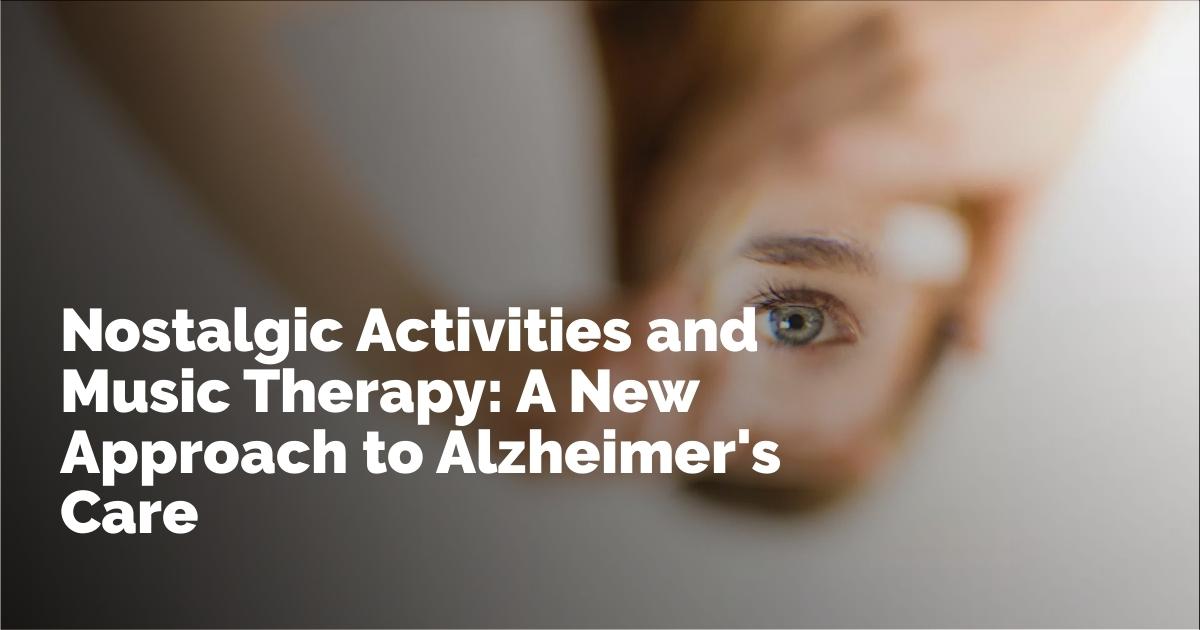Exploring the Transformative Impact of Nostalgic Music Therapy on Alzheimer's Disease Outcomes
Introduction
Alzheimer's disease (AD) is a progressively debilitating neurodegenerative disorder that affects millions globally. Characterized by a continuous decline in cognitive abilities, emotional stability, and daily functioning, AD poses significant challenges to both patients and caregivers. As the global population ages, the prevalence of AD is increasing, becoming a major contributor to disability and mortality among the elderly. Traditional pharmacological treatments offer limited relief and come with potential side effects, prompting a search for alternative therapeutic strategies. In recent years, non-pharmacological interventions have gained attention for their efficacy and minimal side effects, particularly music therapy.
Music therapy, specifically nostalgic music therapy, plays a significant role in enhancing the quality of life for AD patients by stimulating cognitive functions and emotional responses. By intertwining culturally resonant music with traditional activities, this therapeutic approach aims to improve memory, reduce anxiety and depression, and promote better sleep, making it an appealing avenue for holistic AD management.
Study Design and Methodology
A recent study conducted at the Sichuan Provincial Psychiatric Center explored the benefits of nostalgic music therapy combined with culturally themed activities on individuals with mild to moderate AD. This meticulously designed randomized clinical trial involved 63 patients diagnosed with AD who were divided into two groups: a control group receiving standard care and a treatment group receiving nostalgic music therapy.
The trial spanned twelve weeks, with the treatment group participating in weekly music-based sessions paired with activities related to Chinese solar terms. These sessions incorporated listening to culturally themed music, engaging in traditional games, and participating in crafts, fostering cognitive stimulation and social interaction.
Cognitive and Emotional Performance Enhancements
The study utilized the Mini-Mental State Examination (MMSE) and the Montreal Cognitive Assessment Scale (MOCA) to assess cognitive improvements, alongside the Self-Rating Anxiety Scale (SAS) and the Self-Rating Depression Scale (SDS) to evaluate emotional well-being. Results indicated that members of the treatment group experienced significant improvements in cognitive function, evidenced by higher MMSE and MOCA scores post-intervention. Emotional assessments also showed notable reductions in anxiety and depression, highlighting the therapeutic effectiveness of the music sessions.
These findings support the idea that interactive and culturally meaningful therapies can play a pivotal role in enhancing the mental health of AD patients. By tapping into familiar memories and experiences, nostalgic music therapy not only boosts cognitive performance but also provides emotional comfort and relief.
Improvements in Sleep Quality
Sleep disturbances are common among AD patients, often exacerbating cognitive and emotional symptoms. This study evaluated sleep quality using the Pittsburgh Sleep Quality Index (PSQI), finding that participants in the music therapy group reported better sleep quality post-intervention. The tranquil and familiar nature of the music likely played a role in this improvement, by easing anxiety and promoting relaxation, thus positively influencing sleep patterns.
Discussion and Implications
The integration of nostalgia-inducing music and cultural activities presents a promising, multifaceted approach to managing AD symptoms. This study's findings reinforce the potential of music therapy to not only stimulate cognitive function but also to address emotional and sleep disturbances. Such interventions offer a low-cost, non-invasive complement to conventional treatment, enhancing overall patient well-being.
Despite the positive outcomes, the study acknowledges several limitations, including a small sample size, short intervention duration, and cultural specificity. Future research should include larger, diverse populations over extended periods to verify the sustainability of these benefits and explore the universal applicability of such therapies across different cultural contexts.
Conclusion
Nostalgic music therapy emerges as a powerful tool in the holistic management of Alzheimer's disease. By harnessing the emotional and cognitive power of music intertwined with cultural memories, this therapeutic approach significantly improves cognitive function, emotional well-being, and sleep quality in AD patients. As healthcare continues to evolve, non-pharmacological strategies like nostalgic music therapy will likely play an increasingly vital role in comprehensive care plans for those affected by neurodegenerative diseases. Future studies will undoubtedly further unravel the intricacies and benefits of integrating cultural elements into therapeutic interventions, paving the way for more personalized and effective treatments for Alzheimer's disease.
출처 : Original Source

